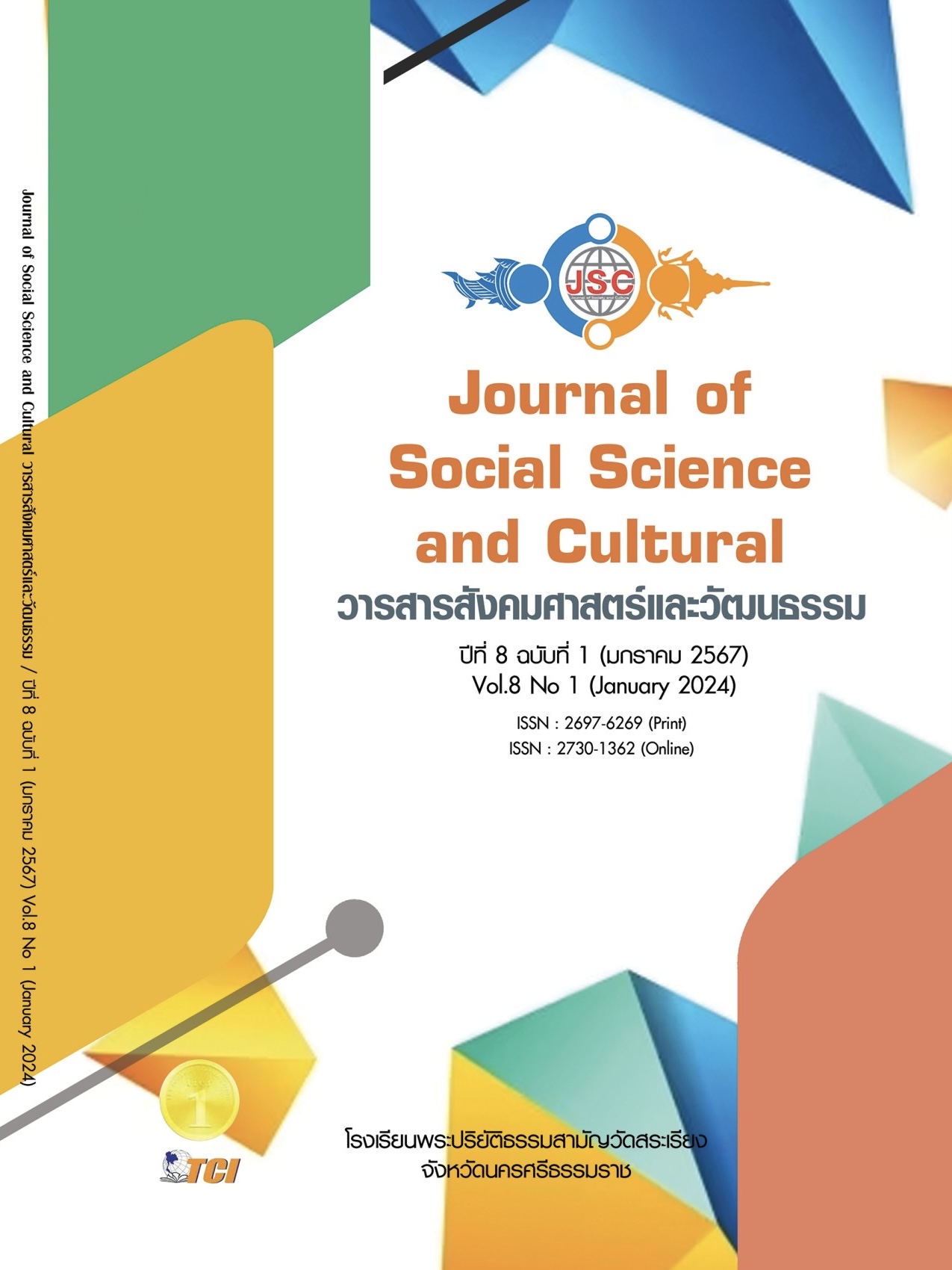CULTURAL COMPETENCY OF TEACHERS ISLAMIC PRIVATE SCHOOL OF SPECIAL DEVELOPMENT ZONE, SOUTHERN BORDER PROVINCE
Main Article Content
Abstract
This research Study of cultural competency of teachers in private Islamic schools. Southern Border Special Area Development Zone By teachers in the local private schools teaching Islam. In the special area development zone of the southern border provinces, namely Yala, Pattani, Narathiwat and 4 districts of Songkhla, namely Thepha District, Saba Yoi District, Nathawi District and Chana District, 100 people per province, totaling 400 people. Research tools, part 1, general information. The respondents included gender, age, work experience. Work positions in educational institutions, part 2, 5-level rating scale questionnaire with a confidence value of 0.914. Statistics used in data analysis include mean and standard deviation. The research results found that Teachers at private Islamic schools in the southern border provinces were female, 307 people, representing 76.75 percent, were male, 93 people, representing 23.75 percent, were 30 years old and under, 223 people, representing 55.75 percent, were 31 years old and over. There were 177 people, representing 44.25 percent, with work experience of 6 years or more, 158 people, representing 39.50 percent, with work experience of 5 years or less, 127 people, representing 31.75 percent, and teaching in the area of Pattani and Narathiwat provinces. Yala and Songkhla, the same number of 100 people, and private school teachers teaching Islam in the southern border provinces. Has cultural competence ( = 4.02,SD = 0.46) at a high level When considering each aspect, it was found that cultural competency in all 5 areas is the aspect of seeing the world in a broad picture (
= 4.12,SD = 0.55) self-understanding (
= 4.05,SD = 0.53) the ability Adjustment (
= 4.05,SD = 0.57) understanding of others (
= 4.04,SD = 0.51) and cultural sensitivity (
= 3.75,SD = 0.59) were at a high level.
Article Details
References
ไข่มุก อุทยาวลี. (2562). โครงการวิจัยการศึกษาประวัติศาสตร์สังคมพหุวัฒนธรรมจากตำนานท้องถิ่นภาคใต้. ใน รายงานการวิจัย. สํานักงานคณะกรรมการส่งเสริมวิทยาศาสตร์วิจัยและนวัตกรรม.
ชยพล มั่นจิต. (2563). ความสัมพันธ์ของความเข้มแข็งของการมองโลก. วารสารพุทธจิตวิทยา, 5(2),18-24.
ชุตินันท์ จันทรเสนานนท์. (2553). การพัฒนาแบบวัดสมรรถนะเชิงวัฒนธรรมสำหรับนักเรียนมัธยมศึกษา. ใน ดุษฎีนิพนธ์ครุศาสตรดุษฎีบัณฑิต สาขาการวัดและการประเมินผลการศึกษา. จุฬาลงกรณมหาวิทยาลัย.
พวงรัตน์ ทวีรัตน์. (2543). วิธีการวิจัยทางพฤติกรรมศาสตร์และสังคมศาสตร์. กรุงเทพมหานคร: มหาวิทยาลัยศรีนครินทรวิโรฒ ประสานมิตร.
วิเชียร พันธ์เครือบุตร. (2557). สมรรถนะการประกอบวิชาชีพและการทำงานข้ามวัฒนธรรมในประชาคมอาเซียนของบัณฑิตไทย. วารสารการพัฒนาชุมชนและคุณภาพชีวิต, 2(2), 225-232.
สำนักงานคณะกรรมการการศึกษาเอกชน. (2556). แผนยุทธศาสตร์ส่งเสริมการศึกษาเอกชน พ.ศ. 2556 - 2560. กรุงเทพมหานคร: สกสค. ลาดพร้าว.
สำนักงานคณะกรรมการพัฒนาเศรษฐกิจและสังคมแห่งชาติ. (2559). สรุปสาระสำคัญแผนพัฒนาเศรษฐกิจและสังคมแห่งชาติ ฉบับที่สิบสอง พ.ศ. 2560 - 2564. กรุงเทพมหานคร: สำนักงานคณะกรรมการพัฒนาเศรษฐกิจและสังคมแห่งชาติ สำนักนายกรัฐมนตรี.
สิทธิชัย ทองมาก และคณะ. (2561). เหลียวหลังแลหน้า คุณภาพการศึกษาในสามจังหวัดชายแดนภาคใต้. วารสารมหาวิทยาลัยนราธิวาสราชนครินทร์ สาขามนุษย์ศาสตร์และสังคมศาสตร์, 5(ฉบับพิเศษ), 186-198.
อังคณา จิรโรจน์. (2558). สมรรถนะทางวัฒนธรรมของผู้บริหารการพยาบาล และพยาบาลประจำการโรงพยาบาลศูนย์สังกดักระทรวงสาธารณสุข. วารสารวิทยาศาสตร์ และเทคโนโลยี, 23(6), 1006-1022.
Goode, T. D. (2004). Definitions of cultural competence. National Center for Cultural Competence: Georgetown University Center for Child and Human Development.
Johnson, B. & Christensen, L. (2004). Educational Research: Quantitative, Qualitative and Mixed Approach. (2nd ed). Boston: Pearson Education.
Walton, R. E. (1974). “Improving The Quality of Work Life”. Harvard Business Review, 52(3), 12-16.


